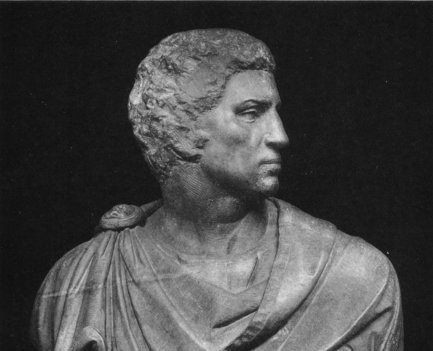Most people know the story of the assassination of Julius Caesar on the 15 March 44 B.C.E. Shakespeare made the event famous in his play Julius Caesar, and has left many saying “Beware the ides of March.”1 However, the assassination of Caesar may never have happened if Marcus Brutus had not agreed with Cassius. To understand the complete story of the assassination of Caesar, one has to understand the role that Marcus Brutus played.
Marcus Junius Brutus the Younger, better known as Brutus, is descended from Lucius Junius Brutus, founder and first consul of the Roman Republic in 509 B.C.E. The political future of Rome was so important to Lucius that he ordered his oldest two sons put to death for their desire to restore Rome to a monarchy. Lucius spared the life of his youngest son and it is through him that Marcus was born.2 Brutus’ own father, Marcus Brutus, was killed by Pompey the Great during a revolt.3
So who was this Brutus? He was a typical Roman, who received the traditional education of the Roman elite and was greatly influenced by the writings of Plato. Upon completion of his education, Brutus was given a position in the government.4 In both his marriage and in his public life, Brutus was expected to align with Caesar, but instead, he made his peace with Pompey the Great, eventually siding with him during the Roman Civil War in 49-48 B.C.E.5
Brutus was captured at the Battle of Pharsalus and spared by Caesar, causing Brutus to switch sides to Caesar.6 It is important to note at this time that Caesar had a special fondness for Brutus, believing Brutus was his son, born out of a love affair Caesar had with Servilia, Brutus’ mother. Out of this fondness, Caesar had instructed his commanders not to harm Brutus should he be captured in battle.7 Caesar pardoned Brutus for his role during the Civil War and gave him a high ranking government job. Brutus in turn convinced Caesar to give a government position to Cassius, Brutus’ brother-in-law.8
It was during this time following the Civil War that Caesar declared himself dictator of Rome, as allowed by the constitution during times of emergency, but not to last more than six months. Caesar wore the robe, crown, and scepter of the general, and called himself imperator. As leader of Rome, he had complete control over the armies. Many senators felt their power being threatened and feared that Caesar would soon appoint himself King of Rome.9
Cassius did not like Caesar, and soon began to plot to end his reign of power. He attempted to recruit his friends and fellow senators, but they refused to go along with Cassius unless he could convince Brutus to join them.10 Brutus had such an honorable reputation that his participation was crucial to the success of the cause. Brutus agreed to participate because of his family history in creating and protecting the Republic at its founding and the ensuing Roman tradition of opposing all forms of tyranny. Both Brutus and Cassius believed that once Caesar was dead, Rome would naturally return to the traditional Republic.11
The group of conspirators had heard that Caesar would be attending a senate meeting on March 15, and they planned the assassination for that day. They knew that it would not look suspicious, since they all had to attend the meeting of the senate and they believed that the Ides of March was a blessed day to make their move, since it was a religious holiday in Rome. Ironically, there was a statue of Pompey the Great, the leader Caesar had killed after the Civil War ended, in the portico where the assassination was to take place as soon as Caesar arrived. The conspirators believed it to be the perfect date and place to make their attempt to restore the Republic.12

However, on the planned day, Caesar was late and the conspirators became worried. When Caesar finally arrived, the senators surrounded him as he took his seat, and the attack began. All the senators attacked at once, creating a frenzy in which many of the them were stabbed in the process; even Brutus was stabbed in the hand. When that attack was over, Caesar was dead.13 The next day, Antonius (also known as Mark Antony), the sole remaining consul, granted all the conspirators amnesty, and distributed provinces to them as rewards. Brutus was given the province of Crete and moved there with his family where he continued to work for the government.14

Meanwhile, Octavian, Caesar’s nephew and heir, was brought to the capital to take Caesar’s place as leader of Rome. Octavian was angry that Antonius had pardoned the conspirators and when the common people of Rome learned of the assassination of Caesar, they too were angry that none of the conspirators had been punished. This rift between the people and the leaders began to cause a rift between Octavian and Antonius. Soon the leaders of Rome began to align themselves between Octavian and Antonius, and another war civil war began. Known as the Post-Caesarian Civil War, this war was between Octavian and his supporters and Antonius and his supporters in order to end the rift that had been growing. It did not take long for Antonius to be defeated by Octavian, resulting in a truce that joined their armies together. This is also when the Second Triumvirate was formed in 43 B.C.E. between Octavian, Antonius, and Marcus Lepidus allowing the three of them to rule Rome together.15
The next civil war in Rome, known as the Liberators’ Civil War, was fought between the Second Triumvirate and the liberators (those who assassinated Caesar and their supporters). Brutus and Cassius were the main targets of the Roman army and separately rallied troops to fight with them. Brutus, according to Plutarch, “was esteemed by the many for his virtues, but loved by his friends, admired by the nobles, and not hated even by his enemies.”16 Because of this, many people in Rome had faith in his motives and believed that while the other senators had murdered Caesar out of hatred and spite for his power, Brutus had participated because he truly wanted to end the tyranny that he believed Caesar had created in Roman government.17 Unable to defeat Octavian’s army, Cassius, fearing being captured, committed suicide.18
Unfortunately for Brutus, his army was not able to defeat the Roman army either, and he admitted defeat at the Battle of Philippi in 42 B.C.E. Also fearing being captured, Brutus fled to the hills with a good friend and fellow soldier. It was there that Brutus convinced his friend to take his sword and hold it upright, Brutus then fell upon his sword, killing himself. Antonius still held much respect for Brutus and had his body wrapped up in the finest purple cloth for the cremation. After he was cremated, his ashes were sent to his mother, since his wife was already dead, another suicide.19
Even after his death, Brutus served as a role model for senators and his story reminded emperors that they served at their own peril if they ignored the senate.20 Brutus did not end tyranny or civil war, with many battles leading to the loss of the Roman Republic. According to Shakespeare, Brutus acted out of honor to protect his home from a tyrant. Dante placed Brutus in the worst level of Hell in the mouth of Satan next to Judas Iscariot.21 Either way one remembers Brutus, one must remember the conspiracy would never have gotten anywhere without the participation of Brutus.
- William Shakespeare, Julius Caesar (Boston: Ginn and Company, 1908), Kindle edition, Act 1 scene 2. ↵
- Salem Press Biographical Encyclopedia, January 2017, s.v. “Marcus Junius Brutus,” by Michael Witsoki. ↵
- Salem Press Encyclopedia, January 2016, s.v. “Brutus,” by Richard Westall. ↵
- Salem Press Biographical Encyclopedia, January 2017, s.v. “Marcus Junius Brutus,” by Michael Witsoki. ↵
- Salem Press Encyclopedia, January 2016, s.v. “Brutus,” by Richard Westall. ↵
- Salem Press Encyclopedia, January 2016, s.v. “Brutus,” by Richard Westall. ↵
- Plutarch, Plutarch’s Lives Volume IV (London: George Bell & Sons, 1892), 402, Project Gutenberg, https://www.gutenberg.org/files/44315/44315-h/44315-h.htm#Page_398 (accessed October 23, 2017). ↵
- Plutarch, Plutarch’s Lives Volume IV (London: George Bell & Sons, 1892), 404-405, Project Gutenberg, https://www.gutenberg.org/files/44315/44315-h/44315-h.htm#Page_398 (accessed October 23, 2017). ↵
- Funk & Wagnalls New World Encyclopedia, 2016, s.v. “Caesar, Gaius Julius.” ↵
- Plutarch, Plutarch’s Lives Volume IV (London: George Bell & Sons, 1892), 407-408, Project Gutenberg, https://www.gutenberg.org/files/44315/44315-h/44315-h.htm#Page_398 (accessed October 23, 2017). ↵
- Salem Press Biographical Encyclopedia, January 2017, s.v. “Marcus Junius Brutus,” by Michael Witsoki ↵
- Plutarch, Plutarch’s Lives Volume IV (London: George Bell & Sons, 1892), 410-412, Project Gutenberg, https://www.gutenberg.org/files/44315/44315-h/44315-h.htm#Page_398 (accessed October 23, 2017). ↵
- Plutarch, Plutarch’s Lives Volume IV (London: George Bell & Sons, 1892), 413, Project Gutenberg, https://www.gutenberg.org/files/44315/44315-h/44315-h.htm#Page_398 (accessed October 23, 2017). ↵
- Plutarch, Plutarch’s Lives Volume IV (London: George Bell & Sons, 1892), 416, Project Gutenberg, https://www.gutenberg.org/files/44315/44315-h/44315-h.htm#Page_398 (accessed October 23, 2017). ↵
- Plutarch, Plutarch’s Lives Volume IV (London: George Bell & Sons, 1892), 418-419, Project Gutenberg, https://www.gutenberg.org/files/44315/44315-h/44315-h.htm#Page_398 (accessed October 23, 2017). ↵
- Plutarch, Plutarch’s Lives Volume IV (London: George Bell & Sons, 1892), 425, Project Gutenberg, https://www.gutenberg.org/files/44315/44315-h/44315-h.htm#Page_398 (accessed October 23, 2017). ↵
- Plutarch, Plutarch’s Lives Volume IV (London: George Bell & Sons, 1892), 425, Project Gutenberg, https://www.gutenberg.org/files/44315/44315-h/44315-h.htm#Page_398 (accessed October 23, 2017). ↵
- Plutarch, Plutarch’s Lives Volume IV (London: George Bell & Sons, 1892), 443-446, Project Gutenberg, https://www.gutenberg.org/files/44315/44315-h/44315-h.htm#Page_398 (accessed October 23, 2017). ↵
- Plutarch, Plutarch’s Lives Volume IV (London: George Bell & Sons, 1892), 449-453, Project Gutenberg, https://www.gutenberg.org/files/44315/44315-h/44315-h.htm#Page_398 (accessed October 23, 2017). ↵
- Salem Press Encyclopedia, January 2016, s.v. “Brutus,” by Richard Westall. ↵
- Kim Zarins, “‘Et tu, Brute?'” Calliope 17, no. 4 (December 2006): 42-44. ↵



83 comments
Ruby Wynn
This is an interesting article. When I was learning Latin, I read a lot about Brutus and the assassination of Caesar, so I enjoyed reading this article. I did not know that Caesar believed that Brutus was his son. It is heartbreaking that so many people committed suicide from this one event. Brutus felt like he had a duty to the Roman people to protect them from tyranny because of his ancestry, and that, unfortunately, led to many deaths, including his own.
Annissa Noblejas
Well researched, I appreciated the polar views between Shakespeare and Dante’s depiction of Brutus. Either way someone chooses to look at Brutus’ motives, he was a key component to Caesar’s assassination. Brutus descended from a strong legacy of Roman’s who sought to keep Rome a republic and were willing to kill for that vision. He true motives will never be known, but his intended goal ultimately failed.
Eric Ortega Rodriguez
This was a very interesting article. I am sure that most of us have read the story and about the assassination of Julius Caesar. I always knew that Brutus played a major role in it as well. However, this article does a splendid job to elaborate on why Brutus did what he did. He felt the responsibility to help the people and remove Caesar from power. Overall, this was a very fascinating and original article. Good work.
Pamela Callahan
I have never heard Brutus’s story before, but I found it to be very interesting. I found it strange that Antonius pardoned all the people who plotted to kill Caesar. I can understand why Octavius would have been mad and why the Post-Caesarian Civil War was started. Octavius, being Caesar’s nephew, wanted only to bring justice to his uncle and the way in which he was killed and in winning the war I think he was able to do so.
Daniela Duran
I had never heard about Brutus, but I am impressed by how he was liked by everyone. I do believe that what he did was completely out of love for his land, and because he authentically wanted to protect it from a tyranny. Still, his actions were not the best, because he still committed murder in some way. I believe that, indeed, without his participation, the conspiracy would not have worked, but I wonder if the conspiracy brought anything good in the end. There were so much problems after the assassination, that perhaps this would have been better if they had not taken any action against the Caesar. Anyhow, this was a good article!
Raymond Nash Munoz III
The topic of the article was extremely enticing, especially since I have always been fascinated with Roman history. But, majority of the author’s transition and conclusion sentences felt anti-climatic, in the fact that the paragraphs were built up with great detail that seems to lead to a great ending sentence, but then just repeats something that was previously stated. Now, while the transition and conclusion sentences do lack climatic weight, I still recognize the great research the author conducted for this article and the incredible structure they created to unfold Brutus’s significance in Caesar’s assassination.
Ysenia Rodriguez
Marcus Brutus had much respect throughout Rome and was considered an honorable man although he was a part of the assassination of Caesar. Its interesting that although Brutus was always a part of constant conflicts, he remained a likable man throughout Rome and even served as a role model after his suicide. This article was very interesting and well written and I am glad I was able to learn more about who Marcus Brutus was.
Luke Lopez
This was a great article on Marcus Brutus, and how he was influential in the assassination of Caesar. Brutus opposed dictatorships in Rome, and he thought that if he were to kill Caesar then Rome would be restored to a republic. Brutus along with the other roman senators killed Caesar, which resulted in Octavian being named as the leader of Rome at this time.
Alexander Manibusan
In Latin class we actually did discuss how there was one account where Caesar claimed that Brutus was his son. The two would later grow close to each other. Now I would also be concerned about the rise of tyranny. But couldn’t Brutus find another way to end it, rather than killing his close friend? Even though Brutus committed a terrible crime (along with the other senators) I feel like Brutus was in a situation where he had no choice but to join them. I feel like his tragedy was darker than that of Caesar’s.
Belia Camarena
I clicked on this article because in high school I read the poem “Friends, Romans, Countrymen, lend me your ears”, and it got me interested in Marcus Brutus. I knew that he was involved in the assassination of Julius Caesar, but I did not know that his intentions were indeed honorable; he was truly interested in the preservation of the Republic. Great job writing this article! I really liked how the author focused on lesser known aspects of Brutus’ life.
Jonathan Perez
The story of the betrayal of Caesar is well known and is briefly described in this article. However, what i enjoyed about this article was that it focused on Brutus more than the events in murdering Caesar. The details of Brutus’ pardon prior to the assassination and the wars that followed are not as well known so it was great to read about it. I also enjoyed how the author leaves it up to the reader to decide whether or not Brutus acted for justice or simply betrayed Caesar. Overall a great article to read.